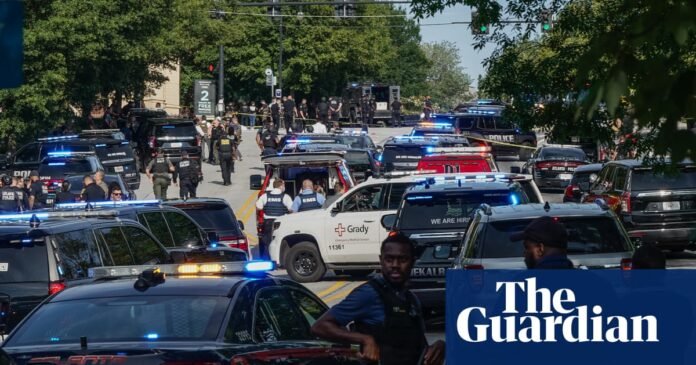The police officer who was shot to death in a confrontation with a gunman near the Centers for Disease Control and Prevention (CDC) in Atlanta has been identified as 33-year-old David Rose – a husband and father of two daughters who had a son on the way.
Rose, who joined the DeKalb county police force in September of last year and previously served in the US marines, was responding to reports of gunfire near the CDC campus when he was stuck. He was later rushed to the Emory University hospital, where he died of his injuries.
The Georgia bureau of investigation (GBI) identified the suspect as Patrick Joseph White, 30, of Kennesaw, Georgia. He died during Friday’s violence.
The GBI said in a statement that “there is extensive evidence to collect due to the complex scene. Numerous interviews are being conducted. This investigation will take an extended period of time.”
White reportedly sprayed the CDC at Emory University with bullets before taking shelter in a nearby pharmacy. He was later found dead on the second floor of the building. Authorities have not said if he was killed by police or took his own life.
He was reported to be wearing a surgical mask and was armed with two handguns, a rifle and a shotgun, and he was carrying two backpacks filled with ammo, CNN reported.
The CDC director, Susan Monarez, confirmed that at least four buildings at the public health agency had been struck in the shooting, which began shortly before 5pm on Friday.
“The active shooter incident near our campus today has understandably brought fear, anger and worry to all of us,” Monarez said in a message to CDC employees. “I want to express my deep appreciation for your professionalism and resilience during this time.”
Atlanta-headquartered CNN reported that police were investigating the shooting under the theory that the dead gunman was motivated by a belief that he had been made sick by the Covid-19 vaccine.
One of White’s neighbors told the Atlanta Journal-Constitution: “He very deeply believed that vaccines hurt him and were hurting other people.”
CNN also reported that White’s father alerted law enforcement before the shooting that he believed his son was suicidal.
Cody Alcorn with Atlanta’s 11 Alive reported that White’s neighbor said he was against vaccines and had looked “noticeably” slimmer recently. Another neighbor described White as “pleasant” and said he never talked politics “but was against the vaccine”.
The outlet also reported that crime scene investigators found more than 40 bullet holes in multiple CDC buildings after Friday’s attack. Building 21, where the CDC director has her office, took much of the gunfire.
The Department of Health and Human Services (HHS) secretary, Robert F Kennedy Jr, who is an avowed skeptic of vaccine safety, shared a post from Monarez on X in which she described being heartbroken by Friday’s shooting and said the “top priority is the safety and well-being of everyone” at the agency. But Kennedy did not immediately comment himself.
The Atlanta police chief, Darin Schierbaum, said the department had received a call about an active shooter at about 4.50pm and arrived at the scene to find Rose critically injured.
Atlanta’s mayor, Andre Dickens, said in a statement that Rose had “bravely responded to the active shooter incident on Emory’s campus and lost his life while protecting so many others”.
“Officer Rose served DeKalb county with courage, integrity and unwavering dedication,” the DeKalb police force said in a statement. “Even in the face of danger was he diligent in his duty to protect our community.”
DeKalb county’s interim police chief, Greg Padrick, said Rose “was committed to serving the community” and requested prayers for “his family, his friends, his loved ones and the entire DeKalb county police department family”.
after newsletter promotion
The director of the FBI, Kash Patel, said Rose was a hero who “made the ultimate sacrifice”.
“Pray for the family, friends, and colleagues of this hero who acted quickly to defend others and made the ultimate sacrifice,” Patel said in a post on X.
Dickens said the alleged shooter “is a known person that may have some interest in certain things that I can’t reiterate right now with any confidence until the investigation is fully conducted”.
If confirmed that the gunman was motivated to attack the CDC by anger over the Covid vaccine, it will come as the US healthcare system is warning of elevated threats of violence against its professionals.
The Bureau of Labor Statistics reports that the rate of injuries from violent attacks against medical professionals grew by 63% from 2011 to 2018. And hospital safety directors say that aggression against staff escalated as the Covid-19 pandemic intensified in 2020.
A survey by National Nurses United, the largest union of registered nurses in the US, found that 48% of the more than 2,000 responding nurses reported an increase in workplace violence.
In December, UnitedHealthcare chief executive officer Brian Thompson was shot dead on a Manhattan street. Suspect Luigi Mangione, who is awaiting trial in the case, left a trail of indicators that he may have been motivated by anger toward the health insurance industry.
Friday’s shooting outside the CDC also comes as public trust in the US health system is placed under stress from intense politicization.
Kennedy Jr recently ordered the cutting of the budget for mRNA vaccine development.
He said in a statement that the Biomedical Advanced Research and Development Authority (Barda) would terminate 22 mRNA vaccine development investments, suggesting the vaccines “fail to protect effectively against upper respiratory infections like Covid and flu”.
The HHS said some final stage contracts will continue, but “no new mRNA-based projects will be initiated”.





